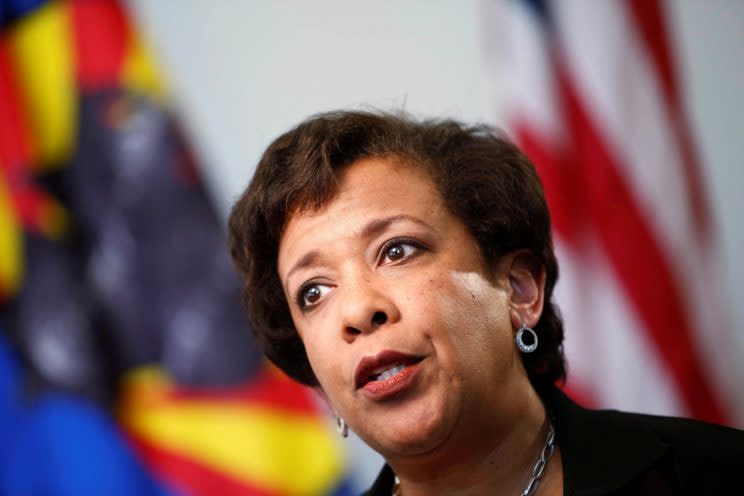Justice Department clarifies Lynch remarks about Clinton email probe: ‘The AG is the ultimate decider’

Attorney General Loretta Lynch said Friday that she will take a step back from the decision whether to charge anyone in the Hillary Clinton private email server probe. But a Justice Department spokeswoman quickly clarified her remarks, telling Yahoo News that top political appointees will remain involved in the investigation and that the attorney general will be “the ultimate decider.”
Lynch told Washington Post journalist Jonathan Capehart in an interview at the Aspen Ideas Festival that she will accept whatever recommendations the FBI and career prosecutors make. (Career prosecutors are Justice Department lawyers who were not appointed by the president.)
“The recommendations will be reviewed by career supervisors in the Department of Justice and in the FBI and by the FBI director. And then, as is the common process, they present it to me and I fully expect to accept their recommendations,” Lynch said.
But Lynch’s remarks, intended to calm a political storm over her impromptu meeting with former President Bill Clinton, did not fully outline the Justice Department’s process for handling one of its most politically sensitive investigations in years.
The Justice Department’s chief spokeswoman confirmed to Yahoo News that at least two political appointees — Assistant Attorney General for National Security John Carlin and Deputy Attorney General Sally Yates — will review the recommendations of career prosecutors and agents before any final determination is made.
“They all expect to receive and accept the recommendations,” Melanie Newman, the Justice Department’s chief of public affairs, said when asked about the role of Carlin and Yates, both of whom are appointees of President Obama. “But it is true they will all be in the process.”
Asked if either Carlin or Yates could overrule the recommendations of FBI agents and career prosecutors, Newman replied: “It is unlikely there will be such a circumstance. But, obviously, that possibility exists.” And, she added, “The AG is the ultimate decider.”
The announcement comes after Republicans and some Democrats criticized Lynch for a half-hour meeting on Monday with Clinton. Those critics said the meeting suggested a conflict of interest.
“What on earth were you thinking?” Capehart asked Lynch of her meeting with the former president.
Lynch said the meeting at the Phoenix airport was primarily social and that the email inquiry was not discussed. She said they talked about Clinton’s grandchildren. “I certainly wouldn’t do it again, because I think it has cast a shadow over what it should not, over what it will not touch,” Lynch said, adding that the questions over the Justice Department’s integrity have been “painful.”
The FBI is investigating whether Hillary Clinton or others mishandled classified information by using a private email server for official business while she was secretary of state.
Some Republicans have called on Lynch to completely recuse herself from the inquiry and appoint a special prosecutor to handle it, arguing that a Democratic appointee cannot fairly head an investigation that potentially has a big influence on the presidential election.
This step falls short of that rather drastic solution. “A recusal would mean I wouldn’t even be briefed on what the findings were,” Lynch said. “While I don’t have a role in those findings or coming up with those findings, … I will be briefed on it and I will be accepting their recommendations.”
The step does mean, however, that Lynch is promising she would not change the outcome of the investigation or attempt to downgrade the recommendations, which attorneys general have done in the past. (Former Attorney General Eric Holder, for example, downgraded the recommended charge for Gen. David Petraeus’ mishandling of classified information to a misdemeanor.)
Lynch said she has long planned to defer to the recommendations of the FBI and career prosecutors but decided she should take the unusual step of announcing the decision to clear up doubts over a conflict of interest.
The investigation into Hillary Clinton’s private email server has been overseen by Richard Scott, the deputy chief of the Counterintelligence and Export Control Section of the Justice Department’s National Security Division, who ultimately reports to Carlin.
Updated, 1:38 p.m. ET: This piece has been updated to reflect Lynch’s announcement and additional reporting.

